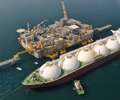

Chinese buyers are seeking more liquefied natural gas (LNG) cargoes despite record prices, bidding above market rates as the winter season starts with the country’s gas inventory low, several trade sources told Reuters.
China, which has this year overtaken Japan as the world’s top buyer of the super-chilled fuel, is grappling with its worst power outages in years in the northeast, triggered by coal shortages.
This in turn is pushing up demand for natural gas in power generation as Beijing orders energy and power companies to ensure sufficient supplies to avoid outages during winter when heating supply is crucial, the sources said.
“Chinese buyers have been asking and buying cargoes for winter and have been indicating prices at above market rates,” a Singapore-based LNG trader said.
“In this market, there is no choice except to pay up to secure cargoes.”
Spot Asian LNG prices LNG-AS surged to a record high of $34.47 per million British thermal units (mmBtu) on Thursday, up more than 500% from the same period last year.
Typically, when spot prices surge, price-sensitive Chinese buyers would shun buying from spot market. But last week, Unipec, the trading arm of China’s Sinopec, sought 11 LNG cargoes for winter and likely bought more than it required, traders said.
The state energy firm said on Thursday that it planned to import 13.3 billion cubic metres (bcm) of LNG this winter – about 9% higher than imports last winter – to operate its existing terminals at full capacity, and accelerate adding gas storage by the end of October.
Other Chinese majors including China National Offshore Oil Corp (CNOOC) and PetroChina 0857.HK are also seeking cargoes to be delivered in winter, several trade sources said.
Gas inventory in China is at below average levels at some terminals, one trader said, citing private industry data, which is also stoking fears of further supply crunch within China.
However, the sharp spike in prices is keeping second-tier gas importers – which are mostly city-gas firms – at bay, the traders added.
With international gas prices currently about double domestic ones, these firms risk making huge losses when they sell to domestic consumers, they said.
To mitigate losses, China’s finance ministry said on Thursday it will speed up approvals for value-added tax rebates on natural gas imports, to help boost winter energy supplies.
The potential financial risk could also be driving Chinese state majors to step up and procure cargoes to ensure there is enough supply during winter and ahead of the Winter Olympics to be held in February, they added.
CNOOC earlier this week signed a long-term deal with Qatar Petroleum, with supplies expected to start in January, which may also help meet demand.
Spot prices started surging during summer in the northern hemisphere amid hot weather and competition from Europe for LNG as gas inflows to the region slowed due to maintenance.
Buyers in Asia, including China, had kept purchases at a minimum hoping prices would drop in the off-peak season of September-October, but that never happened.
“China definitely does not have enough gas for winter. The question is whether this is going to cause demand destruction in the form of more power cuts,” a Singapore-based trader said.
Source: Reuters (Reporting by Jessica Jaganathan, additional reporting by Chen Aizhu; editing by John Stonestreet)